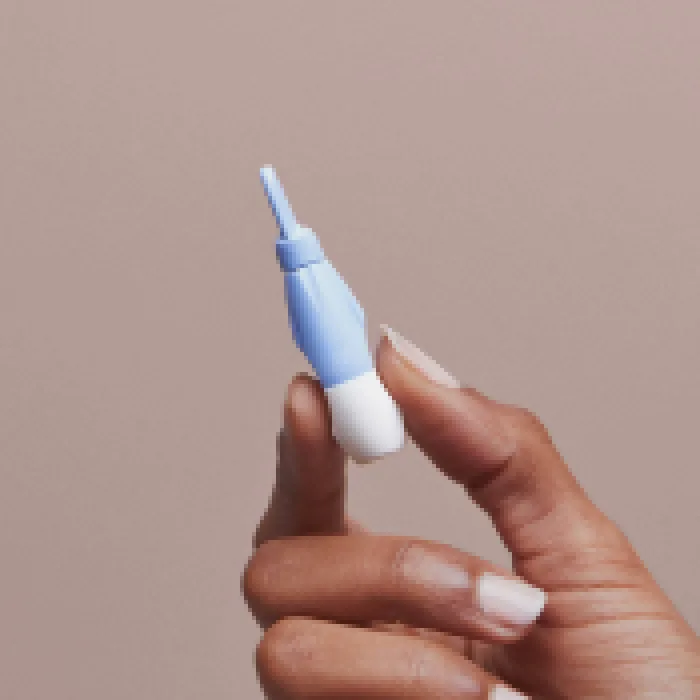Here's what we'll cover
Here's what we'll cover
It’s normal for your weight to ebb and flow from day to day, but did you know that it can happen surrounding your period, too? Rest assured that it’s normal—and temporary—to gain a few extra pounds when it’s that time of the month.
Read on to learn about what causes weight gain before your period and what you can do to prevent or lessen it.
Is weight gain during your period normal?
If you notice that you weigh a few extra pounds during your period (or your clothes are feeling a bit tighter), you’re not alone.
It’s common for people to feel heavier or gain a little bit of weight in the leadup to their period. In fact, researchers have studied and noted this since the 1960s (Watson, 1965). More recently, a 2015 study observed that 65% of women experience swelling as a PMS (premenstrual syndrome) symptom, which is a key culprit in real or perceived period weight gain (Tacani, 2015).
If this worries you, you can relax; PMS symptoms, including weight gain, should fade away within a few days after your period starts. Period bloating and weight fluctuations are mostly due to excess water retention (edema). Once your hormone levels and salts normalize after your period, your body should shed the extra fluid.
What causes period weight gain?
The female body experiences hormonal fluctuations all month long; it’s what underpins your menstrual cycle and your ability to become pregnant. Hormones, key players in the menstrual cycle, don’t just dictate your period and fertility; they are complex and powerful substances that also guide and regulate a wide range of bodily functions.
Hormone fluctuations affect water retention, appetite, and more—all part of how they cause swelling and weight gain before and during your period.
Water retention
The hormone estrogen is the main character in your menstrual cycle, spiking in the weeks leading up to your period. One of the effects of estrogen is to increase salt retention in your body, which causes you to hold more water (Raghunath, 2015).
Another sex hormone, progesterone, peaks shortly before your period. Progesterone can prompt salt and water retention and cause your blood vessels to relax and retain more fluid (Tacani, 2015). These two factors cause your body to hang onto extra fluid in the short term.
Increased appetite
Many people experience changes in their appetites before their periods—including food cravings or increased appetite (Yonkers, 2008). A week of indulging in cravings (especially salty and carbohydrate-rich foods) can elevate your salt levels and contribute to bloating and weight gain surrounding your period.
Bloating and constipation
It’s common to feel constipated and bloated before and during your period. One reason for this is that higher levels of progesterone slow down your gastrointestinal tract (decreasing its motility), so the things you eat get processed out of your body more slowly; in other words: you don’t poop as often. Add to that the possibility of increased appetite and extra water retention, and it’s not surprising if you notice a little extra weight (Coquoz, 2022).
Decreased exercise
Let’s be honest—when feeling PMS-y, many of us feel more like napping on the couch than heading to the gym. But if you’re used to exercising regularly, skipping exercise for several days straight may make you feel more bloated and uncomfortable, especially if you aren’t able to shed your excess water through sweating like you normally might.
What other symptoms are normal?
Temporary weight gain is just one of the many signs that your period is coming. Indeed, nearly half of women experience some kind of PMS symptoms (Gudipally, 2021). Some other all-too-familiar symptoms of PMS may also include:
Mood swings and crying
Lower back or abdominal pain
Breast swelling and tenderness
Headaches
Irritability and anger
Appetite changes
Constipation
Anxiety and restlessness
Fatigue
How to avoid period weight gain
While it’s not always possible to avoid some of the bloating and water-weight gain that come with a period, there are a few things you can do to try to decrease or manage it:
Drink lots of water
Eating a lot of salt makes you thirsty because your body deals with salt by flushing it out through your kidneys with water. The same goes for when your body holds onto salts because of your hormones.
Drinking plenty of water the week before your period will help reduce the amount of salt in your body’s tissues so that it won’t hold onto as much extra fluid. If you’re dehydrated, your body will hang onto all the fluid it can to make sure it can deal with salt—not the ideal situation if you’re looking to avoid bloating and weight gain.
Don’t eat too much salt
As we’ve discussed, several factors are at play before your period that cause your body to hang onto salt: hormones, appetite, and even changes to exercise habits. Eating some salt is normal and important for your health, but if you can, decreasing your salt intake around your period might help. Avoid salty foods or those with a lot of added salt (especially common with processed foods) in the week before your period.
Get moving
It may be the last thing you want to do when you’re feeling cranky, crampy, and bloated, but light exercise is a great way to keep your blood moving, discourage fluid retention, and help you sweat out excess water and the salts that make it stick around. As a bonus, exercise will help increase your endorphins and overall feelings of wellness.
Get a massage
Great news: massage therapy has been shown to reduce water retention (and thus, weight gain) due to your period! A small study found that women receiving five weeks of massage therapy had improved pain, less “menstrual distress,” and reduced water retention (Hernandez-Reif, 2009).
Five weeks of massages may be a little out of most of our budgets, but if you can afford a monthly splurge or ask a partner to rub you, it may help work some of that excess water weight out of your tissues.
The bottom line on period weight gain
To recap: an increase in body weight before or during your period is normal! Many people who menstruate experience it, and it’s nothing to worry about. However, if you notice sudden weight gain that’s not usual for you and your menstrual cycle, it may be beneficial to reach out to your healthcare provider or a gynecologist for a check-up.
DISCLAIMER
If you have any medical questions or concerns, please talk to your healthcare provider. The articles on Health Guide are underpinned by peer-reviewed research and information drawn from medical societies and governmental agencies. However, they are not a substitute for professional medical advice, diagnosis, or treatment.
Coquoz, A., Regli, D., & Stute, P. (2022). Impact of progesterone on the gastrointestinal tract: A comprehensive literature review. Climacteric, 7 , 1–25. doi:10.1080/13697137.2022.2033203. Retrieved from https://pubmed.ncbi.nlm.nih.gov/35253565/
Gudipally, P. R. & Sharma, G. K. (2021). Premenstrual syndrome. StatPearls . Retrieved on June 14, 2022 from https://www.ncbi.nlm.nih.gov/books/NBK560698/
Hernandez-Reif, M., Martinez, A., Field, T., et. al. (2009). Premenstrual symptoms are relieved by massage therapy. Journal of Psychosomatic Obstetrics & Gynecology , 21 (1), 9–15. Retrieved from https://www.tandfonline.com/doi/abs/10.3109/01674820009075603
Raghunath, R. S., Venables, Z. C., & Millington, G. W. M. (2015). The menstrual cycle and the skin. Clinical and Experimental Dermatology , 40 (2), 111–115. Retrieved from https://onlinelibrary.wiley.com/doi/full/10.1111/ced.12588
Tacani, P. M., Ribeiro, D., Barros Guimarães, B. E., et. al. (2015). Characterization of symptoms and edema distribution in premenstrual syndrome. International Journal of Women's Health , 7 , 297–303. doi:10.2147/IJWH.S74251. Retrieved from https://www.ncbi.nlm.nih.gov/pmc/articles/PMC4362892/
Watson, P. E. & Robinson, M. F. (1965). Variations in body-weight of young women during the menstrual cycle. British Journal of Nutrition , 19 (1), 237–248. Retrieved from https://www.cambridge.org/core/journals/british-journal-of-nutrition/article/variations-in-bodyweight-of-young-women-during-the-menstrual-cycle/D530ADD8FAFE13994303CFC103F059D4
Yonkers, K. A., O'Brien, P. M., & Eriksson, E. (2008). Premenstrual syndrome. Lancet (London, England) , 371 (9619), 1200–1210. doi:10.1016/S0140-6736(08)60527-9. Retrieved from https://pubmed.ncbi.nlm.nih.gov/18395582/










